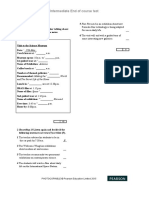0%(1)0% found this document useful (1 vote)
230 viewsAge Related Changes in Endocrine System
The endocrine system undergoes several changes with age:
1. Insulin sensitivity decreases, leading to higher fasting glucose levels over age 50.
2. Hormones related to bone metabolism like parathyroid hormone increase, reducing bone density and strength. Vitamin D and calcium absorption also decline with age.
3. Cortisol levels rise by 20-50% in older adults and take longer to return to normal after stress. This dysregulation is due to changes in the HPA axis and can increase risk of diseases like diabetes and osteoporosis.
4. In males, testosterone levels gradually decrease due to reduced testicular function and increased aromatase activity and sex hormone binding globulin
Uploaded by
Mizrab NadeemCopyright
© © All Rights Reserved
Available Formats
Download as DOCX, PDF, TXT or read online on Scribd
0%(1)0% found this document useful (1 vote)
230 viewsAge Related Changes in Endocrine System
The endocrine system undergoes several changes with age:
1. Insulin sensitivity decreases, leading to higher fasting glucose levels over age 50.
2. Hormones related to bone metabolism like parathyroid hormone increase, reducing bone density and strength. Vitamin D and calcium absorption also decline with age.
3. Cortisol levels rise by 20-50% in older adults and take longer to return to normal after stress. This dysregulation is due to changes in the HPA axis and can increase risk of diseases like diabetes and osteoporosis.
4. In males, testosterone levels gradually decrease due to reduced testicular function and increased aromatase activity and sex hormone binding globulin
Uploaded by
Mizrab NadeemCopyright
© © All Rights Reserved
Available Formats
Download as DOCX, PDF, TXT or read online on Scribd
You are on page 1/ 2
\]
AGE RELATED CHANGES IN ENDOCRINE SYSTEM
1.Describe the effects of aging on the functions of
endocrine pancreas?
Endocrine pancreas produces Insulin. Insulin helps in
the transport of glucose from blood to inside of the cells
which is used as energy. The normal fasting glucose
level rises from 6 to 14 mg/dL after age 50years every
10 years. The cells turn out to be less sensitive to the
effects of insulin.
2. Explain the age related changes in hormones related
to bone metabolism?
Age related changes in hormones related to bone
metabolism are as follows:
Parathyroid hormones increases due to aging and leads
to Osteoporosis. They affect calcium and phosphate
levels which in turn affects the bone strength. Vitamin
D3 decreased production leads to less calcium ion
absorption in the intestines, decreased osteoclasts
production that promotes bone remodelling and
reabsorption. Elderly people are more prone to
fractures due to low bone density.
In women parathyroid hormone in the serum rises due
to deficiency of vitamin D and decrease in renal
absorption of calcium.
3.Describe the changes in glucocorticoids with age and
their biological consequences.
Due to aging the level of cortisol increases by 20 - 50%.
In older people cortisol level rises rapidly but does not
return to normal level for days whereas younger people
it declines to normal. Changes in glucocorticoids is due
to altered neuroendocrine regulation. During aging
there is change in plasma glucocorticoid level. Increase
in nocturnal nadir cortisol levels . Aging leads to
increase in cortisol production rate , weight
independent and increased urinary free cortisol levels in
old age . Secreation of DHEA(Dehydroepiandrosterone)
declines with age and restored partially by
mineralcorticoid antagonism.Glucocorticoids regulates
HPA activity via negative feedback. Changes in HPA
activity results from change in sensitivity to
glucocorticoids. Sensitivity of HPA axis to
dexamethasome. CRH and vasopressin altered during
aging and contributes to hypercortisolism.
Biological consequences: Increase in glucocorticoids
leads to increase in age associated diseases. Excessive
secreation of glucocorticoids leads to prolong catabolic
actions and contribute to onset of disease
(diabetes,osteoporosis,atherosclerosis,reproductive
dysfunction).
4.State the age related changes in hormones concerned
with male reproductive functions?
Age related changes in male reproductive system occurs
in the testes.Testicular tissue mass decreases.
Testosterone level gradually decreases or remains same
and cause slightly slow function.
Due to aging, men experience an increase in aromatose
activity and elevated sex hormone binding globulin
(SHBG). This results in increase in ratio of estrogen to
testosterone and decrease in testosterone levels both
total and free. It is due to the defect of hypothalamicpituitary-testicular axis at all levels; GnRH secreation is
attenuated, response of LH to GnRH decreased and
impaired testicular response to LH. Gradual LH rise with
aging that suggests testis dysfunction main cause of
androgen levels decline.
You might also like
- The Subtle Art of Not Giving a F*ck: A Counterintuitive Approach to Living a Good LifeFrom EverandThe Subtle Art of Not Giving a F*ck: A Counterintuitive Approach to Living a Good Life4/5 (6124)
- The Gifts of Imperfection: Let Go of Who You Think You're Supposed to Be and Embrace Who You AreFrom EverandThe Gifts of Imperfection: Let Go of Who You Think You're Supposed to Be and Embrace Who You Are4/5 (1148)
- Never Split the Difference: Negotiating As If Your Life Depended On ItFrom EverandNever Split the Difference: Negotiating As If Your Life Depended On It4.5/5 (933)
- Hidden Figures: The American Dream and the Untold Story of the Black Women Mathematicians Who Helped Win the Space RaceFrom EverandHidden Figures: The American Dream and the Untold Story of the Black Women Mathematicians Who Helped Win the Space Race4/5 (954)
- The Hard Thing About Hard Things: Building a Business When There Are No Easy AnswersFrom EverandThe Hard Thing About Hard Things: Building a Business When There Are No Easy Answers4.5/5 (361)
- Speakout Perason Intermediate End of Course Test80% (5)Speakout Perason Intermediate End of Course Test8 pages
- The World Is Flat 3.0: A Brief History of the Twenty-first CenturyFrom EverandThe World Is Flat 3.0: A Brief History of the Twenty-first Century3.5/5 (2283)
- Devil in the Grove: Thurgood Marshall, the Groveland Boys, and the Dawn of a New AmericaFrom EverandDevil in the Grove: Thurgood Marshall, the Groveland Boys, and the Dawn of a New America4.5/5 (278)
- Analysing Political Speeches Rhetoric, Discourse and Metaphor (Jonathan Charteris-Black) (Z-Library)No ratings yetAnalysing Political Speeches Rhetoric, Discourse and Metaphor (Jonathan Charteris-Black) (Z-Library)314 pages
- A Heartbreaking Work Of Staggering Genius: A Memoir Based on a True StoryFrom EverandA Heartbreaking Work Of Staggering Genius: A Memoir Based on a True Story3.5/5 (692)
- AE Operation and Maintenance Manual of 170 Series Marine Diesel EngineNo ratings yetAE Operation and Maintenance Manual of 170 Series Marine Diesel Engine123 pages
- Jingjiao The Church of The East in China and Central AsiaNo ratings yetJingjiao The Church of The East in China and Central Asia711 pages
- Brand Awareness & Preference Regarding Havells Green CFL PDF100% (1)Brand Awareness & Preference Regarding Havells Green CFL PDF74 pages
- Ac090fcapeh PCC Compartment Samsung Outdoor UnitsNo ratings yetAc090fcapeh PCC Compartment Samsung Outdoor Units66 pages
- En Koodave Irum O Yesuve - Tamil Christian Song Keyboard Notation Notes PDF-Kve MusicNo ratings yetEn Koodave Irum O Yesuve - Tamil Christian Song Keyboard Notation Notes PDF-Kve Music1 page
- The Karnataka Coop Socities Rules, 2013No ratings yetThe Karnataka Coop Socities Rules, 201356 pages
- CBSE Sample Paper Class 7 Maths Half Yearly Set 1100% (1)CBSE Sample Paper Class 7 Maths Half Yearly Set 15 pages
- How A COE (Center of Excellence) Drives Efficiency Across Your Organization - LinkedInNo ratings yetHow A COE (Center of Excellence) Drives Efficiency Across Your Organization - LinkedIn5 pages
- Brian Tracy 18 Pasos para Programar La Mente para El ExitoNo ratings yetBrian Tracy 18 Pasos para Programar La Mente para El Exito19 pages
- Configuring Sequences With SFC: Simatic Pcs 7No ratings yetConfiguring Sequences With SFC: Simatic Pcs 720 pages














































































